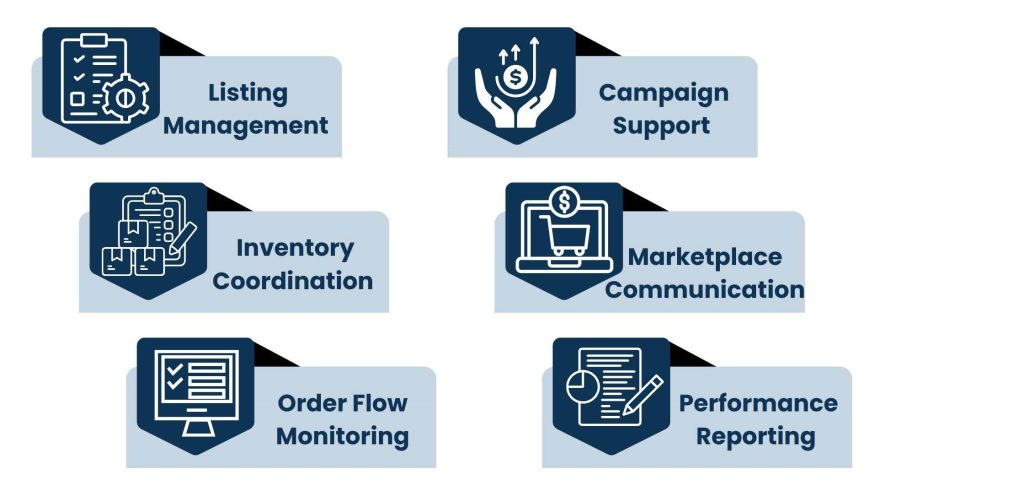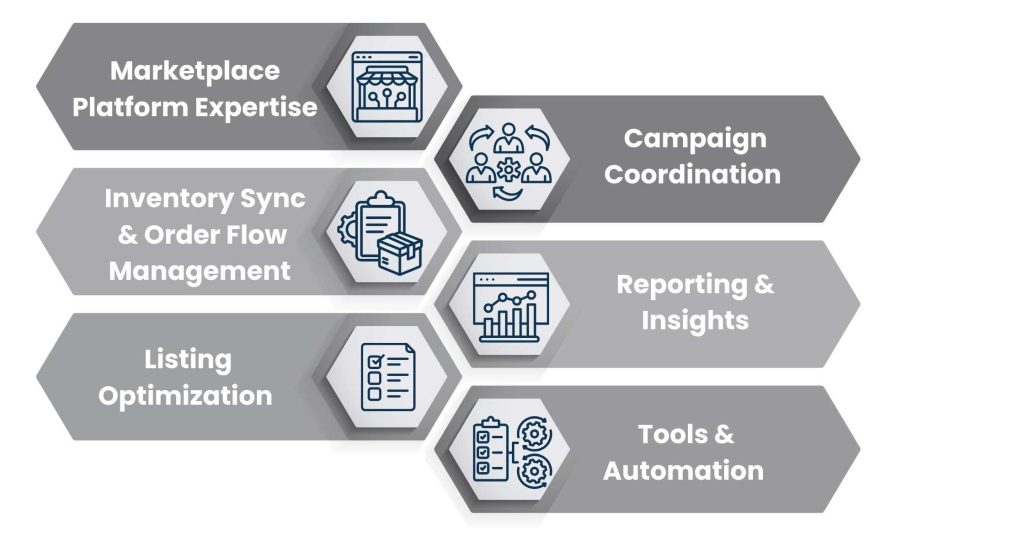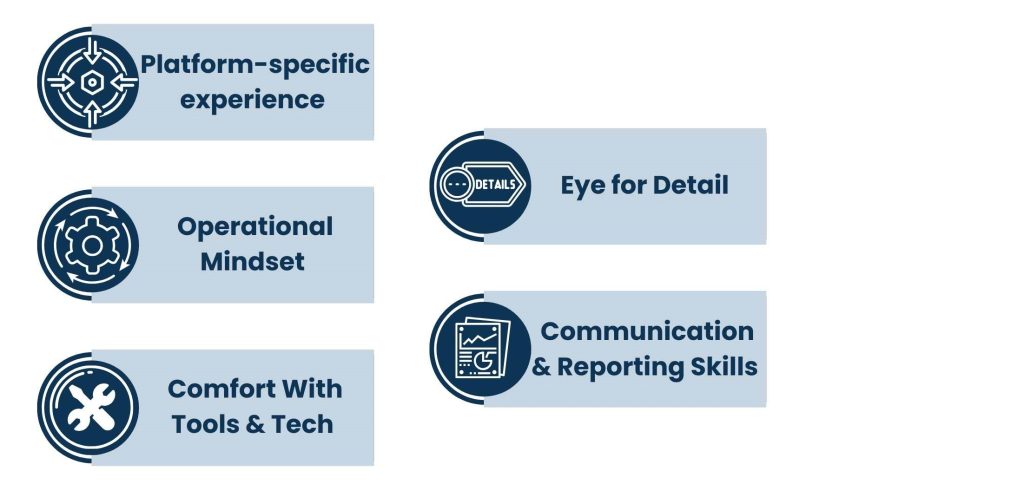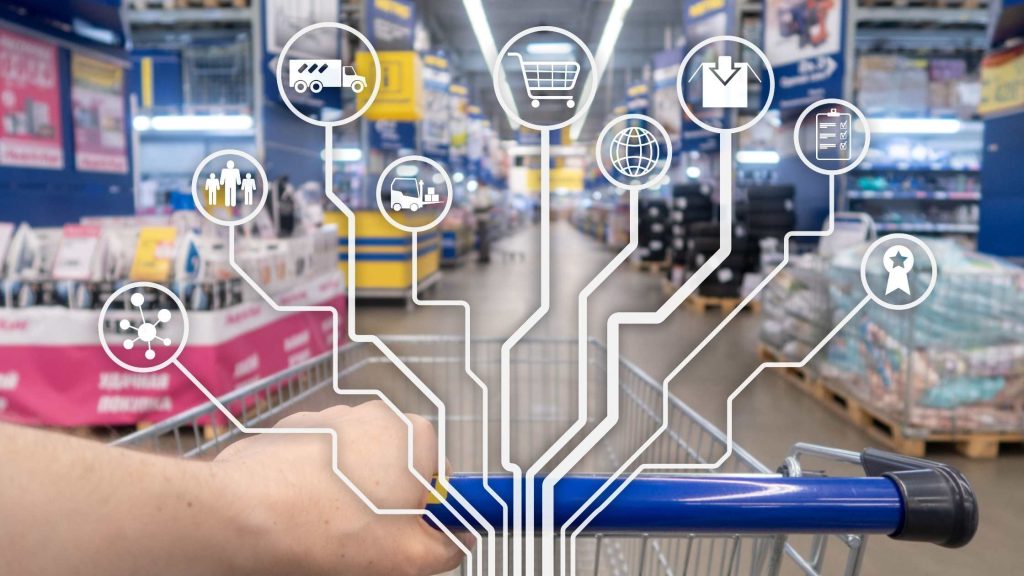Introduction
Scaling a product-based business used to mean building your website and focusing all your energy there. But today? Success almost always means selling across multiple platforms — Amazon, Flipkart, Myntra, Shopify, and maybe even your own D2C store. The more touchpoints you create for your customers, the more chances you have to convert them.
But here’s what we’ve seen happen far too often: in the rush to go multi-channel, teams end up buried in complexity.
Listings get inconsistent. Inventory goes out of sync. Orders slip through the cracks. And suddenly, the thing that was supposed to increase your revenue is causing delays, refunds, and support headaches.
This is exactly where an e-commerce specialist becomes essential.
They’re not just managing product uploads or responding to tickets — they’re the engine behind smooth operations, smart listing strategies, and channel-specific growth. Whether you’re a small team scaling fast or an established brand looking to optimize, having the right person managing your e-commerce back-end makes everything else easier.
In this guide, we’re breaking down what an e-commerce specialist does, why their role matters across every sales channel, and how the right systems help you scale — without chaos.
Who is an E-commerce Specialist and What They Do?
A lot of people still think of this role as someone who “uploads SKUs” or handles order reports. That’s one part of it — but it barely scratches the surface.
A skilled e-commerce specialist wears multiple hats. They’re a hybrid of strategists, operations coordinators, listing experts, and platform-specific problem solvers. More than anything, they’re the person who connects all the moving parts of your e-commerce business into one smooth, trackable system.

Here’s a quick overview of what they handle day to day:
📝 Listing Management:
An e-commerce expert writes product descriptions creatively that sell. That means optimizing product titles with relevant keywords, writing descriptions that your target market (in this case, buyers) wants to know, so you can highlight the value and answer their questions, and ensuring the listing complies with each platform’s specific guidelines. They also include image specs, attribute tags, and backend SEO fields, which have a bearing on both discoverability and conversions. A properly optimized listing can increase visibility in search results and decrease customer confusion, resulting in more sales and fewer returns.
🔄 Inventory Coordination:
Keeping inventory aligned across multiple platforms is tricky, especially during sales, restocks, or high-volume seasons. A specialist makes sure you don’t oversell or miss out on revenue due to stockouts. They monitor thresholds, create buffer zones to prevent issues, and ensure warehouse updates are synced with your sales channels in real-time. This coordination avoids fulfillment chaos and keeps your metrics healthy with every marketplace.
🚚 Order Flow Monitoring:
When something goes wrong with an order — delay, failed update, or missing tracking — customers don’t care which platform caused it. They just blame the brand. E-commerce specialists stay on top of every step: order confirmation, processing, shipping, and delivery. They flag errors before they escalate and work with your logistics or support teams to keep customers informed, improving both operations and satisfaction.
🎯 Campaign Support:
Each platform runs promotions differently, and timing them wrong can backfire. A specialist ensures your deals are aligned with inventory, pricing rules, and channel-specific guidelines. They help schedule offers, apply promo codes, set ad budgets, and monitor performance during campaigns. That support helps maximize exposure without damaging margins.
🛠 Marketplace Communication:
Seller dashboards aren’t always intuitive, and when something breaks, getting through to the right support contact can take time. Specialists handle communication with Amazon, Flipkart, Myntra, or Shopify support to resolve account flags, listing suppressions, review violations, or payout issues — saving you time and avoiding costly delays.
📊 Performance Reporting:
Guesswork doesn’t scale. E-commerce specialists pull reports that go beyond surface-level data, analyzing product-wise sales, channel-wise performance, return reasons, and even ad ROI. They help your team identify trends, double down on what works, and catch early signs of trouble before it affects revenue.
This role is half technical and half process-driven, and when it’s done well, it creates the structure your sales team and operations team can rely on.
Also Read: Virtual Assistant Services in Stockholm
Core Skills Every E-commerce Specialist Brings to the Table
Now that we’ve talked about what breaks without one, let’s flip it.
When you have a skilled e-commerce specialist on your team or supporting you remotely, things run smoother, faster, and more profitably. But it’s not just about hiring anyone who understands a platform. The best specialists bring a mix of technical know-how, platform expertise, and process thinking that turns scattered efforts into sustainable growth.

Here are the core skills we’ve seen make the biggest difference:
🛍️ Marketplace Platform Expertise:
An e-commerce specialist should know the ins and outs of platforms like Amazon, Flipkart, Myntra, and Shopify — not just from the customer side but from the seller’s backend. They understand listing rules, ranking algorithms, deal options, and fulfillment requirements. That knowledge saves your team from trial-and-error mistakes and helps you make better channel-specific decisions from day one.
🔄 Inventory Sync & Order Flow Management:
Stockouts and overselling can kill trust fast. A specialist ensures your inventory numbers are accurate across all platforms by either managing it manually or setting up automated syncs through tools like Unicommerce, Zoho, or Veeqo. They also manage how orders flow so you don’t end up fulfilling the same order twice or missing one altogether.
📝 Listing Optimization:
It’s not enough to list a product — it needs to be positioned correctly. That means SEO-optimized titles, sharp product descriptions, high-quality images, bullet points that speak to buying intent, and the right back-end keywords. A good e-commerce specialist can adapt content per platform while keeping your brand voice and message consistent.
🎯 Campaign Coordination:
Running promotions? Flash sales? Sponsored listings? Every platform has its process. Specialists help plan and execute campaigns across each one — making sure you’re not undercutting yourself, missing timing, or violating platform policies. They can also analyze past performance to improve the next run.
📊 Reporting & Insights:
Specialists don’t just do — they report. From sales trends and platform performance to SKU-specific issues or ad ROI, they track the right data, generate weekly or monthly reports, and bring insights you can act on. This helps you make informed decisions, not guesses.
⚙️ Tools & Automation:
From inventory management tools to order trackers, review automation, and cross-platform syncing, a tech-savvy e-commerce specialist knows which tools save time and reduce error. They don’t just use them; they set them up properly and troubleshoot when things go off track.
How a Specialist Helps You Scale Without Burning Out
Let’s be honest — running an e-commerce business is intense. There are a hundred moving parts, and when you start selling across multiple platforms, those parts multiply fast. More listings, more policies, more customers to support, more reports to pull. Without structure, growth can feel like chaos.
That’s why having a strong e-commerce specialist isn’t just helpful — it’s how you scale without exhausting your team.

🧱 They Build Systems That Don’t Break Under Pressure:
Most brands start with manual workflows. You can update stock in Excel, track orders through WhatsApp groups, and edit listings directly in seller dashboards. It works — until it doesn’t. On sale day, one viral product or one platform glitch, and everything can grind to a halt.
An e-commerce specialist steps in to build reliable, repeatable systems. They connect your inventory with the listings, and standardize your product uploads. Along with setting up templates and SOPs that turn scattered tasks into streamlined workflows. So even as volume increases, the pressure doesn’t.
⏰ They Save Time for Founders and Core Teams:
When you don’t have someone owning backend operations, that work ends up falling on someone — usually the founder or senior team members. That means less time for product strategy, branding, partnerships, or customer experience — and more time dealing with updates, errors, and platform requests.
A specialist takes that off your plate. They handle the details, fix what’s broken, and keep things running — quietly and efficiently. That frees up your brain (and your calendar) to focus on real growth.
🔍 They Help You Spot Opportunities (and Avoid Costly Mistakes):
It’s easy to miss opportunities when you’re in the weeds. Maybe a product’s ranking dropped because of a missed update. Maybe a channel is underperforming, but no one’s tracking the data closely enough to know why.
An e-commerce specialist doesn’t just manage — they observe. They catch early signs of friction in your listings, pricing, or campaign structure. They help you act before something becomes a crisis. And on the flip side, they help you identify what’s working so you can double down on it confidently.
📈 They Create Scalable Growth, Not Just More Work:
Scaling isn’t about doing more. It’s about doing better with the right structure to support it. A good specialist helps you grow into new marketplaces without losing control. They set up repeatable processes that work whether you have 10 SKUs or 1,000.
And the best part? They’re not guessing. They’re using your data, platform rules, and best practices to build a system that doesn’t fall apart the minute your order volume spikes.
🤝 They Become the Ops Partner You Didn’t Know You Needed:
This role isn’t just tactical. Over time, a great e-commerce specialist becomes a true strategic partner — someone who knows you as well as any member of your team and helps advise you where to invest your time, energy, and resources.
Whether it’s helping you prep for a big sale, recommending the right tool to automate reviews, or troubleshooting a backend issue with Amazon support, they’re in it with you. That kind of reliable support becomes a serious advantage as you scale.
growth doesn’t have to mean chaos. With the right e-commerce specialist in place, your business can move faster — without constantly feeling like it’s one listing error away from falling apart.
Also Read: Virtual Assistant Services in Uppsala
What to Look for When Hiring an E-commerce Specialist
If you’ve made it this far, you already know how valuable an e-commerce specialist can be. But hiring the right one? That’s where it matters.
Whether you’re bringing someone on full-time, part-time, or using a remote support partner.

Here’s what we always recommend looking for:
1. Platform-specific experience:
They should know the tools you’re using — not just in theory, but hands-on. If you’re on Amazon and Flipkart, they should be familiar with Seller Central, listing rules, and how deals or ad campaigns work inside those platforms. Shopify? They should know how to manage collections, plugins, and basic product setup. This isn’t a role you want someone “learning on the job.”
2. Operational Mindset:
The best e-commerce specialists don’t just react — they set up systems that prevent chaos before it starts. Look for someone who thinks in workflows, builds SOPs, and asks how your current process works (or doesn’t). They should want to improve things, not just maintain them.
3. Comfort With Tools & Tech:
They don’t have to be developers, but they should be confident with Excel, order sync tools, listing automation tools, and whatever WMS or OMS you use. Bonus points if they’ve worked with tools like Unicommerce, Zoho Inventory, or even Zapier to automate basic steps.
4. Eye for Detail:
In e-commerce, small mistakes create big problems. One wrong SKU code, one price error, one unchecked stock sync — and suddenly you’re refunding orders or losing ranking. A solid specialist has that sharp attention to detail baked into how they work.
5. Communication & Reporting Skills:
You don’t just need someone working behind the scenes. You need someone who can report what’s working, what needs fixing, and what your next steps should be. Seek someone willing to send weekly updates, who raises risks early, and who works well with marketing or fulfillment.
Bringing an e-commerce expert on board is not just about filling a role — it’s about unlocking new growth opportunities, protecting your business operations, and ultimately building a business designed to scale.
Conclusion
Multi-channel selling is exciting but it also multiplies complexity. That’s why scaling without structure isn’t sustainable.
A strong e-commerce specialist gives your business that structure. They bring order to the backend, consistency to your listings, visibility to your performance, and the breathing room your team needs to focus on what matters most.
If you’re planning to expand or already feeling stretched, this is the role that pulls everything together. And when you support that role with the right execution team behind the scenes, you’re not just selling more. You’re building a business that can handle it.
About Us
Tasks Expert offers top-tier virtual assistant services from highly skilled professionals based in India. Our VAs handle a wide range of tasks, from part time personal assistant to specialized services like remote it support services, professional bookkeeping service etc. Furthermore, it helps businesses worldwide streamline operations and boost productivity.
Ready to elevate your business? Book a Call and let Tasks Expert take care of the rest.









